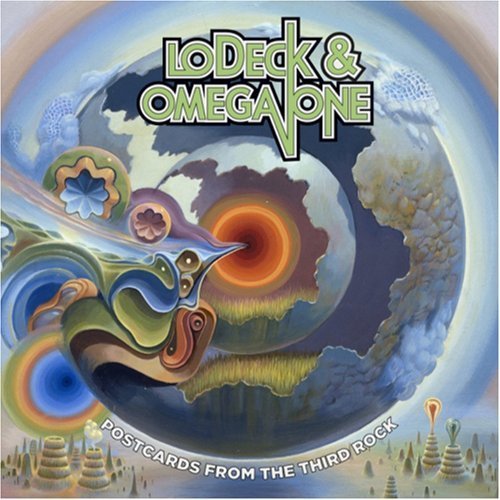Hip-hop bloggers tend to throw around the term “psych rap” a lot these days, and rightfully so, because it definitely applies to many of the more popular independent records coming out right now. However, I’m starting to get the impression that when the average listener hears the term he immediately thinks “songs about popping molly,” which is a shame because, to my ears at least, psych rap and psychedelic music in general are about much more than simply getting high and touching people. Psychedelia is about the expansion of consciousness via the alteration of perception, a change that can occur in a myriad of ways, and while drugs can play a big part in the experience, they are supposed to be more of a means than an end.
Along with a few other monumental releases like Edan’s Beauty and the Beat and Aesop Rock’s Bazooka Tooth, LoDeck and Omega One’s Postcards from the Third Rock stands as one of psych rap’s landmark releases. An aptly titled concept album, it takes listeners on a vacation of the mind while exploring in great depth all the themes we tend to associate with psychedelics, asking us what is real, how do we perceive time and space, where is the line between genius and insanity, and how does the ego inform our senses of identity, individuality, and community.
The wigged man sitting before you listens intently, his jaw gradually dropping to his lace jabot as you explain: “The rapper recites rhythmic poetry over musical pieces often comprised of looped samples and drum breaks.”
“But samples of vhat and vhat is a drum break?” he demands.
“Of records,” you say, forgetting that for all his musical talents, the man in the frocked coat has never heard an audio recording in his entire life, nor will he. For him, the concept does not exist.
“And you call this music?! Absurd!”
That’s what I imagine when I hear “This is as good as back in the day is/ Absurd like a rap song described to Amadeus.” This couplet from “A Day in the Triangle,” perhaps more than any other rhyme on the whole album, forever remains fresh in my mind. From a technical perspective it’s very basic — a two-syllable rhyme with a couple similes, a set-up, and a punch line. But once we really process what LoDeck is saying, a whole world of interpretations begins to emerge. On the surface, he’s literally saying this day in the Bermuda triangle is ridiculous. Yet on a deeper level, by alluding to a breakdown in the fabric of time, he prompts the listener to question the very notion of time itself, more specifically how our perception of it affects our judgment. If we connect the two lines, what’s absurd could be the very premise of the set-up. “As good as back in the day is absurd.” Calling into question the positive connotation normally associated with the phrase “back in the day” raises a valid point and one that is especially relevant to hip-hop fans. Isn’t it somewhat absurd to romanticize a bygone era in its entirety? It’s not like every rap single from 1979 is amazing.
There is an irony here though, in that the couplet itself, were it not for LoDeck’s Russian accent and gravelly delivery, might not sound so out of place in an early ’80s rap tune. As a matter of fact, there are at least one or two records from that era that juxtapose hip-hop and classical music. Perhaps one of them inspired this line… or maybe it was just the sherm and shrooms. Either way, this type of imaginative thinking is exactly what listening attentively to Postcards from the Third Rock encourages. From the metaphysical meanderings of “On a Path” and “Wipe Out Zone” to the lyrically evolved posse cuts “Nice Kids” and “Titanium,” there is not one track on here that fails to get heads nodding and minds working.
The challenge of simultaneously preserving rap music’s traditions and advancing the art form is an idea that comes up continually throughout the album. LoDeck kicks off his second verse of the title track with a dedication, “I’ma send this one out to pioneers who shaped up my ideas/ writers, MCs, engineers, the placeholders,” while the next song, “No Rims,” bluntly conveys the Bensonhurst-based MC’s rejection of tired clichés, with lines like “Bunch of suckers thought they could bluff they way/ to a castle full of gold relaxing with a centerfold/ kicking that embarrassingly old one-two” and “Who the hell could stand that braggadocios/ stomach that stank flow for the length of a show?” The quest to find one’s own place, both in a given subculture and in the world at large, is further explored in the tragic yet triumphant, stranger-than-fiction parable that is “Understand U.”
Tellingly, the artists’ refusal to conform to prevalent industry standards was likely one of the major factors that prevented this album from reaching a larger audience. 2008 came toward the end of a period during which very few progressive hip-hop records were able to make waves in America, so even though the album was critically praised for its cohesiveness by Cool’eh Magazine and given a phenomenal 9.8 rating by IGN, other review sites were less than enthused. HIPHOP DX, for example, dismissed it as “an acquired taste that some may never acquire.” In the end, Postcards from the Third Rock probably did more to advance the genre than it did the careers of LoDeck and Omega One — possibly their intention from the start. One is forced to wonder if the album would’ve been as widely ignored had it dropped in 2012, now that “psych rap” is all the rage. I sincerely doubt it.
